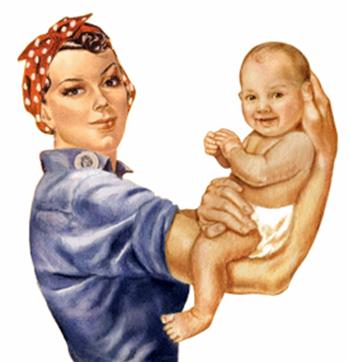Mother’s Day usually means flower bouquets, heartfelt cards, family brunches, and long-distance phone calls. It is a day where we shower our mothers with love and honour to show them just how important they are to us.
But did you know that Mother’s Day has a rich and somewhat unusual past? We have delved into days gone by to bring you the history of this day, controversies and all.
Ancient Mother’s Day
 Mother’s day can be traced back all the way to the ancient Greeks and Romans. The Greeks celebrated their spring festivals in honour of the maternal deity Rhea.
Mother’s day can be traced back all the way to the ancient Greeks and Romans. The Greeks celebrated their spring festivals in honour of the maternal deity Rhea.
The Romans celebrated a similar spring festival dating back to about 250 BCE where they would honour the mothering goddess Cybele. The festivals could last three days with parades, games, and offerings given to the deities.
The holiday also took form when early Christians specifically celebrated the Virgin Mary on the fourth Sunday of Lent, the 40 day period of fasting before the Easter holiday. The celebration was eventually broadened to honour all mothers and, in England, this day was known as Mothering Sunday.
Mothering Sunday
England’s Mothering Sunday dates all the way back to the 1600s and was the first official holiday where people honoured their own mothers as well as the Virgin Mary. Those who were working away from home were encouraged to take the day off to spend time with their families and bring gifts to their mothers.
Who Really Coined The Term Mother’s Day?
There is no question that our modern day Mother’s Day celebrations have evolved since the 1600s. No longer is it the norm to primarily associate Mother’s Day with Greek and Roman deities or the Virgin Mary. Instead we spend time and money ensuring that our own mothers are the centre of attention, changing our focus from a general celebration of maternity to honouring the one person who gave us life. This somewhat updated version of Mother’s Day was first popularized in the United States and can be attributed to a few different people.
Ann Reeves Jarvis and the Mother’s Day Work Clubs
Mother’s Day is usually associated with a woman named Anna Jarvis who proclaimed to be the “mother of Mother’s Day” and fought to keep her title until the day she died. However, her own mother, Ann Reeves Jarvis, was responsible for creating a Mother’s Day that preceded her daughter’s claim to fame. In the 1850s Reeves Jarvis organized women in what was known as Mother’s Day work clubs where women would take steps in improving the health and sanitization of everyday living situations in West Virginia. The goal was initially focused on lowering the infant mortality rate, which was caused by poor living conditions and unsafe food.
During the American Civil War Reeves Jarvis’ work clubs helped wounded soldiers, and in the postwar period held picnics and other events to promote unity and peace.
Julia Ward Howe and the Anti-War Mother’s Day
 A writer and poet, Julia Ward Howe knew fame after the success of her Civil War Song titled, “The Battle Hymn of the Republic”. In the wake of the terror and destruction that both the American Civil War and Europe’s Franco-Prussian war caused, Howe suggested a day called Mother’s Peace Day that promoted peace and unity the world over. The day was championed by mothers who had lost sons to war and was celebrated by women coming together to sing, share essays, listen to sermons, and pray in the name of peace. Many American cities held church services on the day up until the mid-1900s.
A writer and poet, Julia Ward Howe knew fame after the success of her Civil War Song titled, “The Battle Hymn of the Republic”. In the wake of the terror and destruction that both the American Civil War and Europe’s Franco-Prussian war caused, Howe suggested a day called Mother’s Peace Day that promoted peace and unity the world over. The day was championed by mothers who had lost sons to war and was celebrated by women coming together to sing, share essays, listen to sermons, and pray in the name of peace. Many American cities held church services on the day up until the mid-1900s.
Frank Hering: a Father Among Mothers
Frank Hering was a former football coach at the University of Notre Dame and a member of the Fraternal Order of Eagles, a fraternal group focused on the arts. In 1904, he suggested to the Eagles that they observe one day of the year, preferably a Sunday, where they would honour the memory of mothers and motherhood in general. To this day the Eagles consider Hering and the organization to be the founders of Mother’s Day as we know it to be today.
Anna Jarvis and Her Fight for Mother’s Day
After her mother’s work with the Mother’s Day work clubs and in the years following her death, Jarvis organized official Mother’s Day events in her hometown of Grafton, West Virginia starting in 1908. These events grew in size and spread to other cities and towns quickly. Jarvis appointed herself the founder of Mother’s Day and was adamant about the fact that the annual celebration was not for mothers in general but was specific to honour one’s own mother. She endeavoured to ensure that the day’s title was spelled as the singular Mother’s Day, as opposed to Mothers’ Day.
In 1914, U.S. President Woodrow Wilson recognized the events officially, reserving the second Sunday in May as the official Mother’s Day.
In the following years, the commercialization of Mother’s Day as an official holiday was unstoppable. Jarvis fought against it with all that she could including boycotts and lawsuits, trying to keep the intimacy of her holiday, but with little success. She organized official support groups who would continually protest and even storm conventions but it made little difference. Jarvis spent all of her time and money protesting the financial capitalization of Mother’s Day until her death in 1948.
Today Mother’s day is celebrated around the globe and has become a huge industry. In the United States alone, people are expected to spend over $21 billion this Mother’s Day, according to the National Retail Federation’s annual Mother’s Day spending survey.
While this may be the case, it is important to remember that the true reason for celebration is to honour our mothers and all that they mean to us. As long as we celebrate the amazing thing that is motherhood, the true meaning of Mother’s Day will not be lost.







